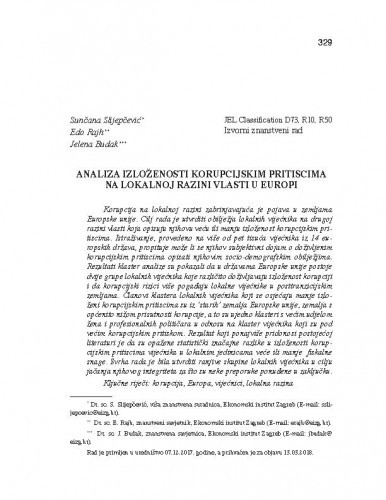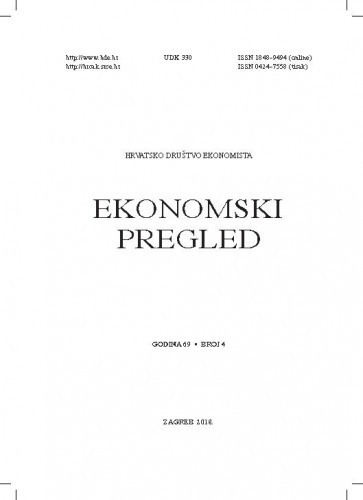Korupcija na lokalnoj razini zabrinjavajuća je pojava u zemljama Europske unije. Cilj rada je utvrditi obilježja lokalnih vijećnika na drugoj razini vlasti koja opisuju njihovu veću ili manju izloženost korupcijskim pritiscima. Istraživanje, provedeno na više od pet tisuća vijećnika iz 14 europskih država, propituje može li se njihov subjektivni dojam o doživljenim korupcijskim pritiscima opisati njihovim socio-demografskim obilježjima. Rezultati klaster analize su pokazali da u državama Europske unije postoje dvije grupe lokalnih vijećnika koje različito doživljavaju izloženost korupciji i da korupcijski rizici više pogađaju lokalne vijećnike u posttranzicijskim zemljama. Članovi klastera lokalnih vijećnika koji se osjećaju manje izloženi korupcijskim pritiscima su iz ‘starih’ zemalja Europske unije, zemalja s općenito nižom prisutnosti korupcije, a to su ujedno klasteri s većim udjelom žena i profesionalnih političara u odnosu na klaster vijećnika koji su pod većim korupcijskim pritiskom. Rezultat koji ponajviše pridonosi postojećoj literaturi je da su opažene statistički značajne razlike u izloženosti korupcijskim pritiscima vijećnika u lokalnim jedinicama veće ili manje fi skalne snage. Svrha rada je bila utvrditi ranjive skupine lokalnih vijećnika u cilju jačanja njihovog integriteta za što su neke preporuke ponuđene u zaključku.; Corruption at the local level is a worrying phenomenon in the EU. The aim of the paper is to identify characteristics of the councillors at the second tier level that describe opinion about their greater or lesser exposure to corruption pressures. The goal of the analysis of opinion of more than five thousand councillors from 14 European countries is to investigate whether their subjective impression of the underlying corruption pressures can be described by their socio-demographic characteristics. Results of the cluster analysis have shown that there are two groups of local councillors in the EU, that they experience corruption differently, and that the corruption risks affect local councillors in post-transition countries more. Local councillors who consider that they are less exposed to corruption pressures are from the “old” EU countries, from countries with a generally lower level of corruption. This is also a cluster with a greater share of women and professional politicians. There are statistically significant differences observed regarding their exposure to corruption between councillors in local government units with larger or smaller level of fi scal decentralisation, and this is the most interesting finding of this research. The purpose of this paper was to identify vulnerable groups of local councillors in order to strengthen their integrity, for which some of the recommendations are given in the conclusion.
Sažetak

 Ekonomski pregled : mjesečnik Hrvatskog društva ekonomista : 69,4(2018) / glavni i odgovorni urednik Dragomir Vojnić.
Ekonomski pregled : mjesečnik Hrvatskog društva ekonomista : 69,4(2018) / glavni i odgovorni urednik Dragomir Vojnić.